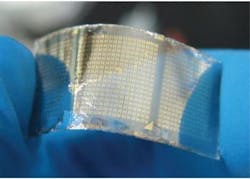Bismuth selenide could be flexible, transparent electrode for solar cells
Palo Alto, CA--Ultrathin flexible sheets of bismuth selenide, in a form called a topological insulator, conduct electricity well and are transparent in the IR, making them a possible candidate for photovoltaic-cell electrodes. A group of researchers, including some from Stanford University and the Stanford Linear Accelerator (SLAC), has shown that sheets of the material remain transparent and highly conductive even after being deeply flexed 1,000 times and folded and creased like a piece of paper.
“It’s rare for a good conductor to be both transparent and durable as well,” said Zhi-Xun Shen of SLAC and Stanford’s Institute for Materials and Energy Sciences (SIMES). Other potential applications include sensors and optical communications devices.
Researchers led by Shen, Zhongfan Liu and Hailin Peng of Peking University in China, and Yulin Chen of Oxford University in England published their results last week in Nature Chemistry. Until recently, Peng and Chen were graduate students and postdoctoral researchers at Stanford and SIMES. They have continued to collaborate with Shen’s research team after being named professors at their current universities.
The researchers made and tested samples of a compound in which sheets of bismuth and selenium, each just one atom thick, alternate to form five-layer units. The bonds between the units are weak, allowing the overall material to flex while retaining its durability. And as a topological insulator—a new state of quantum matter—the material conducts electricity only on its surface while its interior remains insulating, an unexpected property with unknown potential for fundamental research and practical applications.
Since surface atoms dominate the structure of bismuth selenide, it is an exceptionally good electrical conductor – as good as gold. Unlike gold, however, bismuth selenide is transparent to IR. While about half the solar energy that hits the Earth is in the IR, few of today’s photovoltaic cells are able to collect it. The transparent electrodes on the surfaces of most cells are either too fragile or not transparent or conducting enough. The new material could get around that problem.
The researchers’ experiments also showed that bismuth selenide does not degrade significantly in humid environments or when exposed to oxygen treatments that are common in manufacturing. Peng and colleagues made the bismuth selenide samples and conducted flexing, conductivity, and transparency tests in China. The researchers confirmed that the samples were topological insulators at the Stanford Synchrotron Radiation Lightsource’s Beam Line 5-4 at SLAC.
About the Author
John Wallace
Senior Technical Editor (1998-2022)
John Wallace was with Laser Focus World for nearly 25 years, retiring in late June 2022. He obtained a bachelor's degree in mechanical engineering and physics at Rutgers University and a master's in optical engineering at the University of Rochester. Before becoming an editor, John worked as an engineer at RCA, Exxon, Eastman Kodak, and GCA Corporation.

